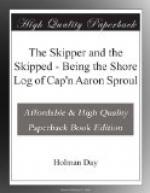The rush down the hill had been so impetuous and the horse was now running so madly under the whip that there was no such thing as checking him. With a crash of splintering wood he drove breast-on against the gate, throwing up his bony head at the end of his scraggy neck. At the crash the woman screamed and covered her eyes. But the outfit was too much of a catapult to be stopped. Through the gate it went, and the wagon roared away through the bridge, the driver yelling oaths behind him.
Cap’n Aaron Sproul walked out and strolled among the scattered debris, kicking it gloomily to right and left. The woman followed him.
“It was awful,” she half sobbed.
“So you’re Miss Jane Ward, be ye?” he growled, glancing at her from under his knotted eyebrows. “Speakin’ of your pets, I should reckon that ’ere brother of yourn wa’n’t one that you had tamed down fit to be turned loose. But you tell him for me, the next time you see him, that I’ll plug the end of that bridge against him if it takes ev’ry dum cent of the prop’ty I’m wuth—and that’s thutty thousand dollars, if it’s a cent. I ain’t none of your two-cent chaps!” he roared, visiting his wrath vicariously on her as a representative of the family. “I’ve got money of my own. Your brother seems to have made door-mats out’n most of the folks round here, but I’ll tell ye that he’s wiped his feet on me for the last time. You tell him that, dum him!”
Her face was white, and her eyes were shining as she looked at him.
“Gideon has always had his own way, Cap’n Sproul,” she faltered. “I hope you won’t feel too bitter against him. It would be awful—he so headstrong—and you so—so—brave!” She choked this last out, unclasping her hands.
“Well, I ain’t no coward, and I never was,” blurted the Cap’n.
“It’s the bravest man that overcomes himself,” she said. “Now, you have good judgment, Cap’n. My brother is hot-headed. Every one knows that you are a brave man. You can afford to let him go over the bridge without—”
“Never!” the skipper howled, in his best sea tones. “You’re the last woman to coax and beg for him, if half what they tell me is true. He has abused you wuss’n he has any one else. If you and the rest ain’t got any spunk, I have. You’ll be one brother out if he comes slam-bangin’ this way ag’in.”
She looked at him appealingly for a moment, then tiptoed over the fragments of the gate, and hurried away through the bridge.
“You ain’t no iron-clad, Kun’l Ward,” muttered Sproul. “I’ll hold ye next time.”
He set to work on the river-bank that afternoon, cutting saplings, trusting to the squall of the faithful parrots to signal the approach of passers.
But the next day, when he was nailing the saplings to make a truly Brobdingnagian grid, one of the directors of the bridge company appeared to him.




